- Home
- Joy Dettman
Jacaranda Blue Page 26
Jacaranda Blue Read online
Page 26
She turned, walking her clay down the hall to her father’s room where she fell across his bed. Exhaustion took her.
London Calling
Dawn birds twittered. The town clock’s resounding Bongs called out across the houses. It sounded like the tolling bell at Miss Moreland’s funeral, and when it silenced, Stella waited for more. Five. Was it five? She lay on her side, remembering other days. How often she had listened for the old clock’s chimes, sweated on its chimes.
She became aware of the odd clothing she wore, and of the position of the window, and of the quilt. Then yesterday’s memories flooded in. She tried to roll from the bed, but her blood had cooled in the night, and her abused muscles did not wish to move. Having fallen asleep across the quilt, she found it had been pulled diagonally across her during the night. Now she pushed it aside with one arm.
Who was she today?
She forced the arm to move again. It reached up to brush the hair from her face. Cogs and gears ground. Metal against metal. Her back screamed as she rolled to the side, and her hand reached down to soothe the scream. Muscles didn’t want to reach. Her neck stung. She could reach that. She rubbed her neck slowly and moved into today’s role.
Play the robot. A robot is programmed for denial of pain, programmed for work, and there was work for it to do. On her feet now, she noticed they were still shod. White shoes. White clay shoes. They walked her to her room, shedding dry white clay.
The naked shape was still lying on her bed. This nightmare had not left at dawn with the others. The world she had known for forty-four years, the world she had moved uncomfortably within, was no more. Everything in the past six weeks had been leading her towards this day. To today, but what was today?
‘Today is – ’
‘What does it matter what today is? I have shed the garb of yesterday with Angel’s beige skirts.’
Function. Work was God today, whatever the day might be.
Muscles and joints grinding, she walked downstairs and out to the shed.
A thin film of moisture lay in the bottom of the pit, seepage from the garden, or down some natural pipeline. Or had one of her dear trees bled? It was unimportant. Tonight the hole would be filled. She would continue until it was filled, and then she would think of the consequences.
One shed door dragged open, she glanced at the Packard, dew wet, the morning too new, and cold. She felt no chill.
Inside the house, she cleared a pathway from her room to the front door. The hall table she moved to the lounge room, giving free passage for her wheelbarrow. It had served her well, but its work was not yet done. She propped the front door wide, then stood looking out at the grey light of morning, and at the town still sleeping.
‘Sleep on, Maidenville,’ she said, returning to her labour upstairs.
Dead weight, she thought, now knowing why people said, ‘a dead weight’. Dead smell. Dead touch.
‘Kiss her, Daughter. Learn forgiveness. It is a lesson that will stay with you. Say your goodbyes.’
‘My kiss would be a lie, Father.’
‘It was not her fault. One day you may understand.’
‘No. I will never understand. I was her child, born of her body. I refuse to understand. I was an innocent in the cruel game she played in her head,’ she said as she took two cold clay feet, and tugged. Not a movement. She attempted to roll the clay that was worse than clay. Kilned clay now. She propped herself against the wardrobe and pushed against it with white clay shoes. It wouldn’t budge.
Then she gave up. She tossed her hands in the air and gave up, she walked back to the door, looking at the blisters on her hands. Yesterday’s labour had all been in vain.
Run away. Take the car and run away to some place. Just drive, keep driving. Dye your hair black. Change your name. Just run.
Mousy One and Mousy Two, in search of cream once strolled into the farmer’s dairy, where Tom the cat patrolled.
‘I won’t run,’ she said. ‘It is much too late to run.’
But Mousy Two, her chin held high, was circling round and round.
‘Please don’t despair, keep swimming, a way out may be found.’
And I will find a way. I will. I will keep swimming around and around in circles, until I find the way out. There will be a way. I’ll telephone Sergeant Johnson and tell him of Miss Moreland’s rape.
That is not the way. Not after her grand funeral. She will not become tea-party gossip for this town, and nor will I.
Then there is no way.
So drown. So, go down without a bubble and drown, Mousy Two.
She walked to her window, staring unseeing at the jacarandas and the shed. Two early birds were flitting from limb to limb.
They nodded, and winked, then pecked at the limb before flying together to the roof of the shed.
A short distance. The shortest possible distance. They were showing her the way.
She turned to the bed, then back to the window. The flyscreen unsnibbed, she propped it against her wall and pushed the window high. She slid the bed with its load across the room.
‘A lump of lead is harder to lift than a long lead rod,’ she told the naked clay. ‘There is an equation to suit this situation. What cannot be easily lifted can be pushed with ease. Pyramids were built without the help of cranes. Man power. Woman power. Slave power. The Stella character will now play the role of Egyptian slave. The pyramid must be done, and today.’
Prop and push. Buttress and roll. Slide and wedge.
One at a time, she lifted the legs of the bed, sliding the great dictionary beneath one, and the bible beneath another. She used Grimms’ fairytales, and Gone With the Wind, just to gain an inch or two, or three. Then with her garden spade beneath the cold clay on her bed, she levered the head and shoulders onto the sill.
So she worked on while time went away. Each gain became the new celebration. She set herself aims, and achieved those aims, and each centimetre on the sill became her new success until the clown head and clay shoulders were well out over the window ledge and she could lever no more.
I should have dug beneath my window, she thought. I should have thought ahead.
‘What has been done cannot be undone,’ she said.
Her bedroom window was screened by the largest of the jacarandas, but she stripped the cover from her quilt and tossed it over the ledge, over the clown, before walking downstairs to her garden.
No movement at her fences. This side of the house was safe from Mr Wilson’s eyes, and as yet little traffic moved on the road. Her window and the shed were both well back from the highway, well protected by her trees and the shrubbery that followed the curved drive, but for the first time she found herself wishing for the return of the hedge.
‘If wishes were fishes then Jesus would have been out of a job,’ she said.
She looked at her wheelbarrow, and knew it was too small. The trailer at the rear of the shed was old, but a well-balanced wooden construction, and light enough to pull over flat ground. She kicked a tyre. Tight. Her father had a small compressor beside his workbench. Tyres, even infrequently used tyres, were never allowed to go flat in the minister’s shed.
‘Dear Father, what exotic pool of genetics did your mother leave behind her? Were her forebears engineers? Were they builders of carriages? Were they too-moral men? Did their women create gardens and pen strange tales? I believe they were a race of survivors, Father. They were the ones who came to this land, tamed this land. Did they kill? Is it in my blood, this willingness to do what must be done to survive?’ she asked, as she began tugging at the coupling frame of the trailer until a wheel moved.
Genetics. What bizarre pool had gone into the making of the boy rapist. Was he the grandson of an addict, of a butcher given licence to cut? He was also the son of a man who could alter his allegiance with a stage kiss.
She turned the trailer and ran it to the wall beneath her bedroom window, flattening her garden as she went. It was unimportant. That which had taken on a
huge importance yesterday was now irrelevant. An azalea, a beautiful thing that bloomed with two different coloured heads, was flattened by a wheel, a lily broken off at the base. The lavender had been overrun by the trailer. Now it lay crushed and broken beneath the trailer floor, its perfume rising, surrounding her. Too potent in the early morning air.
‘Poor things,’ she said, looking around her flattened garden, picking up a sprig of lavender to hold to her nose. ‘Still, you will all grow again, and bloom again.’ She tossed the sprig to the earth, and levelled the trailer, its back to the wall. ‘I have built a perfumed bower to receive him,’ she said. ‘Better it were a pit of flames.’
Hands on her hips, she looked up at her window. The quilt wasn’t covering the head. ‘Thomas the clown, sleeping on my window ledge. You were put together by careless hands. Perhaps it was the fault of your creator, but it is too late now.’
Back in her room she climbed on to the bed where she kneeled between the spread legs, tucking a stiff knee beneath each of her arms – close now, so close to that tool of rape. Weight evenly balanced on the window ledge, when the clown toppled too easily, she was unready. A rigid foot caught beneath the armpit of the sweatshirt she wore, almost dragging her through the window and down to the trailer below.
‘This is the moment when it will all end. Someone will come now. Someone will walk down the drive,’ she said, her head out the window.
But the ancient god of the kill was watching over her. No traffic moved on the highway. Only the two birds, perching on the shed roof, watched her strip her bed, toss sheets, pillow, under-blanket and quilt cover to the trailer, where the reject clown now lay crumpled, half on and half off, its head twisted in a unique position.
‘Are you looking over your shoulder, checking for the hounds of hell who snap at your heels? I only hope they are snapping, and I hope their jaws are wide, and their teeth long, and their saliva acid,’ she said as she left her room, leaving the window wide.
The birds did not blame. They flew across the trailer as she rocked it, rocked it into movement; it was heavier now with its load and too close to the house for ease of manoeuvring, but two wheels are easier to move than the legs of a bed. She had the trailer turned and was pushing it back to the shed when she heard the telephone. She baulked, and a wheel baulked in the circular depression before the door.
No-one in Maidenville rang before eight. It would be a wrong number. She let it ring, while again she rocked the trailer backwards and forwards, backwards and forwards.
Her strength ebbing fast, she was functioning on raw nerve, and the phone’s demand was gouging at raw nerve, but it silenced after the twelfth ring. Relief gave her strength for one supreme effort; and the wheel rose out of the depression and she was through the door. Then the ringing from the house began again. She dropped the trailer, left it there, the shed door swinging wide as she walked across the garden and inside to silence the telephone.
‘What do you want?’ she said, her words – her voice – not Stella’s.
‘Daughter.’
‘Father?’
‘I’ve been ringing for minutes.’
‘Father?’ His voice sounded so close. She heard him cough, and she turned quickly to look over her shoulder, expecting to see him behind her.
What you must ask yourself, Daughter, is what would God think of your actions –?
‘I thought you were out. I’m calling from the airport. I will be boarding the plane shortly.’
‘Where are you?’
‘London.’
‘Have I lost all track of time? You . . . you are flying in on Saturday.’
‘I – ’ Again he coughed. ‘Patrick was able to get us on an earlier flight,’ he said. ‘I . . . I had a dream, Daughter. You were driving your dear mother to church in the Packard. She was young again, and she was to sing the solo. I . . . I had a desire to hear your voice.’ He coughed, and his voice was breathless when he spoke again. ‘Is everything as it should be, Daughter?’
‘Yes, Father.’
Thomas Spencer is dead, a plastic bag over his head, but all is well in Maidenville, she thought. There is a deep pit where the Packard generally lives, Father, but all is well in Maidenville. I am filthy and wearing trousers that encourage unladylike conduct, and I stink of a dead youth, and last night I slept in your bed with my shoes on, but all is well in Maidenville. ‘The congregation has missed you, Father,’ she said.
‘What time is it over there?’
‘Seven?’ She guessed at the time.
‘I got you from your bed, Daughter?’
‘No. Yes. Yes. But perhaps I needed to hear your voice. Perhaps you knew I needed to hear your voice, Father.’
She heard his cough again. ‘I have missed you – ’ he said, and the line was cut.
She looked at the phone, wanting her father back, wanting his sanity back. She clung to the phone, waiting, willing him back, needing him to complete his sentence. ‘I have missed your . . . care . . . cooking . . . laundering . . . I have missed you, Stella, child of my loins.’
Poor Father, too afraid to come any closer than my bedroom door, she thought, as she placed the phone down and stood there, her hand on it, waiting for the ring. Poor Daddy, accused of unspeakable evil if he dared to pat my head.
‘Even a dog is allowed a pat on the head,’ she said.
The phone remained silent.
‘I have missed you, Father. I have missed your voice in these empty rooms, but perhaps I am not yet ready for you to return. I am not yet ready for such sanity. How long is the flight? Twenty-six hours. I have twenty-six hours. And the bus trip. I have thirty-odd hours left – and I have left the shed door open.’ She ran.
Again in the shed, she positioned the trailer carefully. Logic had returned with her father’s voice. She planned to tilt the trailer upright, to lift the coupling frame in the air. The clown lay lengthwise across the trailer, and if all went to plan it should drop neatly into the pit.
She had taken two bricks from the edge of a garden bed, now she used them to place against the wheels, aware that if the trailer ran forward, fell into the pit, she may as well climb in with it and die.
Slowly now she lifted.
The clown clung there.
She lifted higher.
It took only the slightest shift of weight for the clown to tilt, slide sideways, topple. The trailer, as if eager to be rid of its unholy burden, deposited it across the pit, where it balanced a moment, half in, and half out.
‘No. No. No.’ The coupling frame slammed to the earth and she ran to the pit in time to watch the clown bend, slowly fall in. But not in the position she had visualised. It was awkwardly seated in the centre of the hole, the soles of its feet level with the top.
‘God.’ It was a wail, a prayer, a plea as she ran to the shed doors, closed them, bolted them. ‘God. What do I do now?’
‘Eat something,’ a voice replied. ‘And take an Aspro.’
The Safe Compartment of Self
It was eight-ten, the sun high in the sky, she was in the kitchen drinking tea when the phone rang again.
‘Stella Templeton,’ she said, no longer afraid of the telephone. No need to fear it any more. Fear collapse. Fear footsteps in the drive. Fear some fist hammering at the front door, but not the telephone.
‘Stell, it’s me, Marilyn. I’m worried out of my mind. Tommy hasn’t come home for two nights.’
Perhaps there is a place where we go to when there is no peace to be found in our own little hells. Perhaps there is a special place beyond reason, a compartment of self, a primitive centre of the brain where desperation takes control of actions and responses. We survive, Stella thought.
‘Not come home?’ she said.
I am there. I am in the primitive place, in that safe compartment of self. I am functioning on my will to survive. They are coming at me from all directions now, forcing me to know, to accept responsibility for my actions. They are attempting to drag me from this saf
e place of no thought, no guilt, and back into their petty little world. I must respond. I will neither think of minutes past or those to come, only this one. I must respond. I must move a small part of me into this here and now, but allow the rest to stay away in that safe place.
How?
Somehow.
I will be the ear for a supposed friend, who poisoned my reputation in the presence of her son. She, who was given a small precious life to hold and to mould; she, who wasted it, as Angel had tried to waste the life of her Stella child – she did not succeed. I did not allow her to succeed. And I will survive this thing. I will complete this task I have set for myself. ‘He didn’t come home on Monday night, but he’s done that before, so I didn’t worry too much, but this morning, when he wasn’t at breakfast – Stell. Stella. Are you there?’
‘I’m listening, Marilyn.’
‘I rang around all his mates. None of them have seen hide nor hair of him since Monday, after school. He had dinner at home on Monday night. Ron bought fish and chips. Then he went off somewhere on his bike. I’ve just rang Sergeant Johnson, and he said not to worry yet. He said kids take off all the time. I know he’ll be all right. He’s probably ridden to Dorby, and he’s too scared to ring us up to come and get him. He did that once before, you know.’
There was a silence. Stella tried to fill it. She coughed instead.
‘I thought he’d come home last night. I was sure he’d be here this morning, but his bed hasn’t been slept in. Stell? Stell? Are you there, Stell?’
‘Yes.’ Stella responded to her friend’s urging. Ears must hear. Tongues must wag a reply, any reply.
‘What if something has happened to him? What if he was picked up by some deviant? Murdered – ’

 The Hope Flower
The Hope Flower Trails in the Dust
Trails in the Dust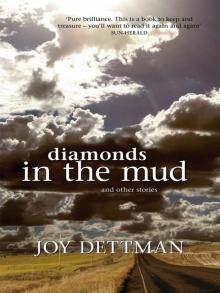 Diamonds in the Mud and Other Stories
Diamonds in the Mud and Other Stories Moth to the Flame
Moth to the Flame The Tying of Threads
The Tying of Threads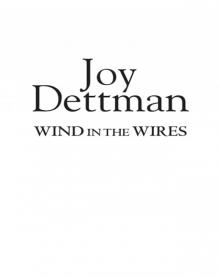 Wind in the Wires
Wind in the Wires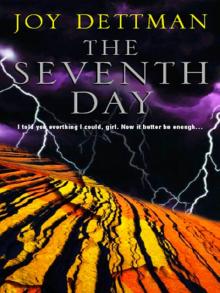 The Seventh Day
The Seventh Day Thorn on the Rose
Thorn on the Rose Jacaranda Blue
Jacaranda Blue Mallawindy
Mallawindy Ripples on a Pond
Ripples on a Pond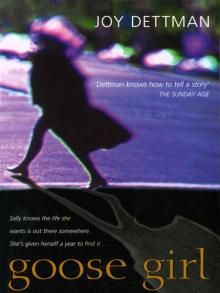 Goose Girl
Goose Girl The Silent Inheritance
The Silent Inheritance Henry’s Daughter
Henry’s Daughter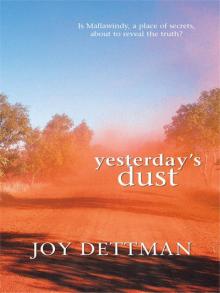 Yesterday's Dust
Yesterday's Dust Pearl in a Cage
Pearl in a Cage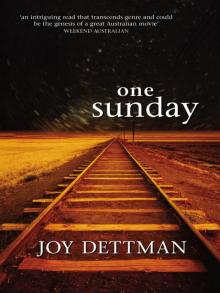 One Sunday
One Sunday